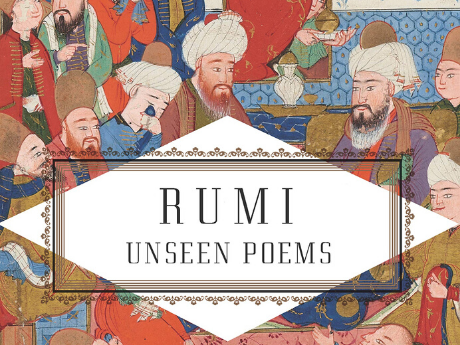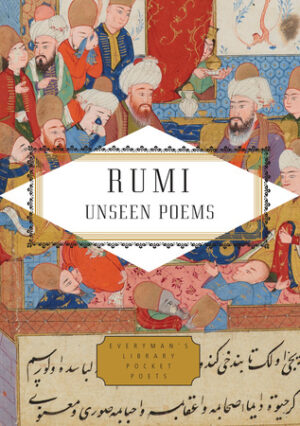In Their Own Words
Brad Gooch on “Rumi: Unseen Poems”

If wheat grows from my soil
If wheat grows from my soil,
The bread you bake will make you drunk.
Both dough and baker are crazy.
The oven recites a drunken poem.
If you visit my grave,
My tomb will make you dance.
Be sure to bring a tambourine.
Don’t be sad at God’s festival.
My chin is shut, within the grave, asleep,
My mouth gnawing on bittersweet love.
If you rip apart my shroud,
A drunken man will unravel your soul.
From all sides, sounds of war and drunken harps,
Empty tasks become fruitful works.
God created me from love’s wine.
I’m still that love even as death wears me down.
I’m the drunken man. My essence is the wine of love.
What do you expect from wine but drunkenness?
I will never rest until my soul flies
To the towering soul of Shams of Tabriz.
Ghazal 683
Translated by Brad Gooch and Maryam Mortaz.
From RUMI: UNSEEN POEMS, translated and edited by Brad Gooch and Maryam Mortaz. Translation copyright © 2019 by Brad Gooch and Maryam Mortaz. Reprinted by permission of Everyman’s Library, an imprint of the Knopf Doubleday Publishing Group, a division of Penguin Random House LLC.
Foreword from Rumi: Unseen Poems by Brad Gooch
“Love speaks a hundred different languages,” exulted Rumi. He might well have said the same of his own ardently recited and ecstatically translated poems of love, which have found their way around the world like “a hundred thousand flames”—to use a favorite Rumi image—since his death in the Turkish city of Konya in 1321. A Persian-speaking poet, displaced from Central Asia during the Mongol terrors and winding up with his family in the Seljuk Empire in Asia Minor, after years of traveling through such thriving Muslim cities as Baghdad, Damascus, and Aleppo, Rumi expressed a polyglot civilization in poetry that segues easily among Persian, Arabic (especially the Arabic of the Quran), Turkish, and Greek. Over seven centuries he has been translated into dozens of languages and claimed as a “national” poet by Afghans, Iranians, and Turks alike.
The heartbeats of American and English poets and translators have often quickened to Rumi as well, beginning with Ralph Waldo Emerson, who translated an exquisitely mystical poem from the German of Rückert: “Of Paradise am I the Peacock, / Who has escaped from his nest.” The English Cambridge “Orientalist” R.A. Nicholson devoted his life to translating Rumi’s six-volume spiritual epic, The Masnavi, often while dressed in Sufi robes and a tall round hat. At a poetry workshop in the United States in the 1970s, Robert Bly presented the young poet Coleman Barks with a volume of the decidedly literal translations of another Cambridge scholar, A.J. Arberry. “These poems need to be released from their cages,” said Bly, and the ensuing flutter of free-verse—almost beat—renditions led to Rumi’s status as the “best-selling poet in America.”
Yet in the decade since I started seeking writings left behind by Rumi, as I researched my biography of his life and times, Rumi’s Secret, I discovered that wide swathes of the poetry were still lying dormant, mostly unseen and unheard by the English reading public. Crucial to this realization has been my collaborator in the translations in this collection, Maryam Mortaz. An Iranian poet and writer living in New York City, Maryam began as my tutor in her native tongue—Persian, or Farsi—even helping long-distance when I studied in Persian immersion programs at University of Texas at Austin and University of Wisconsin at Madison. As the book expanded so did Maryam’s role, and we jointly translated all the prose and poetry in the biography. When we were stumped by swerves in Rumi’s thought, she would call her friend Qhasem Hasheminejad, a poet, novelist, and scholar in Iran; when I was in Tehran, he visited me in my hotel lobby and fixed me with his wise gaze while edgily wearing a Sufi skullcap in public. (The mystical practices of Sufism are discouraged by conservative political and religious leaders, as they were in Rumi’s day.)
Rumi’s Masnavi has been thoroughly translated into English, first by Nicholson in England and now in an ongoing project by Jawid Mojaddedi at Rutgers. Indeed, many current translations of Rumi’s poetry are excerpts from this epic, with titles added. (Rumi never titled any of his poems.) Yet there remain the lyric ghazals, similar to sonnets in length and impact, often with radif, or repeating phrases punctuating line ends. Dizzyingly creative, Rumi wrote more than 3,000 ghazals; of these, only about half have been translated into English directly from Persian. He also wrote about 2,000 robaiyat, the pithy quatrain form made famous in Edward Fitzgerald’s Victorian renditions of Omar Khayyam—an earlier poet whose chill blasts of skepticism likely did not move Rumi. A scholarly translation of all of Rumi’s robaiyat exists, but those in popular circulation number only about 400, leaving the majority of these short haiku-like poems underappreciated.
An obvious question is why so many poems by a celebrated poet have been overlooked. In part it’s an accident of history. Much translation in the past half-century has consisted of standing on the shoulders of Nicholson or Arberry, whose cumulative two-volume edition included about 500 ghazals. Poets have sprung these cages either by infusing them with more spirit or tracing back to the originals in Persian and producing new versions. Yet Arberry, a formidable scholar of Arabic, Persian, and Islamic studies, had his own preferences. We feel he left out some of the poet’s poet works of lilting beauty—lacking any special messages of wisdom—that gave us pleasure. At the other extreme, many popular recent translations avoid references to Islam or allusions to Persian literature and culture that were perhaps judged too foreign or off-putting. I’ve met fans of Rumi—who had his poems read at their wedding—who were surprised to find out he was not a Buddhist.
A number of the poems in the quarry we mined have been understandably bypassed over the years: Rumi repeats himself, and some of his uses of the stock imagery of Persian poetry—stars and moons, nightingales and roses—are fresher than others. A few are impossibly mind-bending as Rumi leads us on travels into the ineffable with only broken language and twisting syntax as our guide. (He broke the rules more than any other classical Persian poet.) We tried to include as many of these puzzles as could be solved, as well as a few favorite poems previously translated by others that we could not resist including. We were transported when we found some of our repeating lines faintly evoking the music of the originals or, most certainly, when we came across gleaming works that were as beautiful or philosophically compelling as anything we had ever read of Rumi’s. Our intention was to find a middle way between academic loyalty and wildly inventive freedom, a medium that might articulate both the personal poems of aching human love, to Rumi’s beloved companion and teacher, Shams of Tabriz, and those of divine love, in his hymns to God that soar like Mohammad’s winged horse Buraq.
Rumi cast himself as a reluctant poet. His attitude was a bit like that of Marianne Moore in her poem “Poetry,” which begins, “I, too, dislike it.” Yet his motives were different. Rumi was a religious leader, composing verses as he whirled himself into trances to annihilate ordinary reality and language in a mystical union with love itself. This urgent and sincere spirit is perhaps responsible for the way the voice of this medieval poet shines through all manner of translations, making him, as a publisher once said to me, “translation-proof.” Persian poets often put their signature, or takhallos, like a tag in last lines. Rumi occasionally used “Silence” as his tag. For him, the most successful poems were failures, breaking apart in silence. “Rip this poem apart like an old piece of cloth,” he wrote, “To set meaning free from words, wind, and air.” We hope this collection will provide fresh glimpses into Rumi’s sublime “world of silence . . . like a bird’s wing.”
This is the foreword from RUMI: UNSEEN POEMS, translated and edited by Brad Gooch and Maryam Mortaz. Copyright © 2019 by Brad Gooch. Reprinted by permission of Everyman’s Library, an imprint of the Knopf Doubleday Publishing Group, a division of Penguin Random House LLC.



